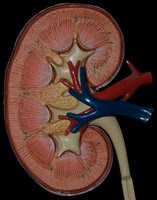There are several types of disasters - hurricanes, tornadoes, icestorms, floods, earthquakes, wild fires. If you are a dialysis patient these present an extra set of circumstances because you may not have access to a dialysis center. Patients should prepare in advance for a disaster regardless of the type, know exactly what they will need to do during the disaster, and have a plan for afterward.
This video was written, created and produced for KCER by Drs. Steve Fadem and Garry Hagstrom. Drs. Fadem and Hagstrom are both veteran nephrologists who have been through several hurricanes and floods. Dr. Fadem has also participated in earthquake rescue seminars in Nepal and Israel.
Preparing for a disaster follows five easy steps - and can be remembered by the five letters R.E.A.D.Y. READY was first coined by the Texas ESRD Emergency Coalition, and is a simple way to remember how to get organized with your disaster plan.
R - RX (prescriptions) - have two weeks worth of medications ready to go, as well as prescriptions, physician numbers, allergies, and information that another facility will need (hepatitis B, tuberculosis status)
E - Emergency room - remember they will be backed up during the disaster. If you are volume overloaded or acutely ill, however, you might have to go there, so you must be familiar with their locations.
A - Access - this is not your fistula, but your phone numbers - key personnel in the dialysis unit, family members and others who will be able to help. Establish means of communication in advance. During a disaster your phone service and electricity may not work.
D - Diet and Fluids - Have a stockpile of nonperishable canned foods appropriate for you diet, and some fluids. Don't forget the can opener.
Y - You - these are the things you need to have. The public, your civic resources, Networks and dialysis units will all have plans in operation, but there are certain items that you are responsible for: where are you going to meet if you cannot get in touch with anyone by pone, and where are you going to go if you must evacuate? Don't forget you pet - its crate and food. You should have a packed bag of certain items you will need at a moment's notice. This is called the "Go" kit. Don't forget your batteries.
- The Go Kit should include
- One gallon of water per day (8 bottles)
- Ready to eat, non perishable food (don’t forget the can opener)
- Plates, utensils and feeding supplies
- Work gloves
- Disposable camera
- Personal hygiene items (soap, deodorant, cosmetics, toothbrush/paste and shaving equipment)
- Hand sanitizer
- Duct tape, hammer, nails and tools
- Sleeping bag
- Flashlights and batteries
- Battery operated radio/TV
- Whistle
- Dust mask
- Pocket knife
- Cash
- Sturdy shoes, clothing, hat and coat
- Map, paper, sharpie
- Waste bucket, toilet paper, plastic bags and a small shovel
- One week supply of medications
- Extra pair of eye glasses
- Extra keys for your house (and car)
- My Important Papers
- Prescriptions
- Allergies
- Dialysis Prescription
- Immunization record (hepatitis B, antibodies, tuberculosis, flu shot, Pneumovax)
- Contact numbers for doctors, dialysis personnel, your Network, NKF and KCER help lines, your dialysis company
- Health Insurance Card






